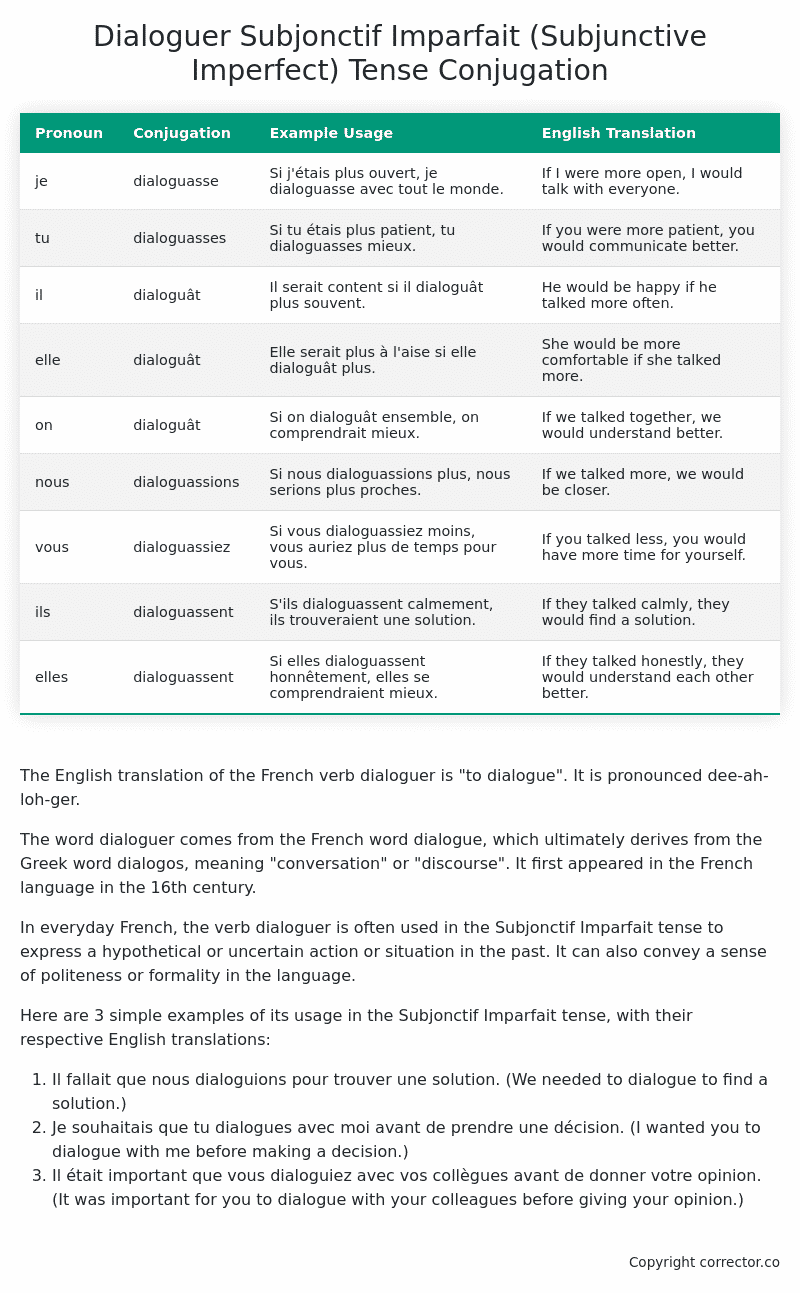Subjonctif Imparfait (Subjunctive Imperfect) Tense Conjugation of the French Verb dialoguer
Introduction to the verb dialoguer
The English translation of the French verb dialoguer is “to dialogue”. It is pronounced dee-ah-loh-ger.
The word dialoguer comes from the French word dialogue, which ultimately derives from the Greek word dialogos, meaning “conversation” or “discourse”. It first appeared in the French language in the 16th century.
In everyday French, the verb dialoguer is often used in the Subjonctif Imparfait tense to express a hypothetical or uncertain action or situation in the past. It can also convey a sense of politeness or formality in the language.
Here are 3 simple examples of its usage in the Subjonctif Imparfait tense, with their respective English translations:
- Il fallait que nous dialoguions pour trouver une solution. (We needed to dialogue to find a solution.)
- Je souhaitais que tu dialogues avec moi avant de prendre une décision. (I wanted you to dialogue with me before making a decision.)
- Il était important que vous dialoguiez avec vos collègues avant de donner votre opinion. (It was important for you to dialogue with your colleagues before giving your opinion.)
Table of the Subjonctif Imparfait (Subjunctive Imperfect) Tense Conjugation of dialoguer
| Pronoun | Conjugation | Example Usage | English Translation |
|---|---|---|---|
| je | dialoguasse | Si j’étais plus ouvert, je dialoguasse avec tout le monde. | If I were more open, I would talk with everyone. |
| tu | dialoguasses | Si tu étais plus patient, tu dialoguasses mieux. | If you were more patient, you would communicate better. |
| il | dialoguât | Il serait content si il dialoguât plus souvent. | He would be happy if he talked more often. |
| elle | dialoguât | Elle serait plus à l’aise si elle dialoguât plus. | She would be more comfortable if she talked more. |
| on | dialoguât | Si on dialoguât ensemble, on comprendrait mieux. | If we talked together, we would understand better. |
| nous | dialoguassions | Si nous dialoguassions plus, nous serions plus proches. | If we talked more, we would be closer. |
| vous | dialoguassiez | Si vous dialoguassiez moins, vous auriez plus de temps pour vous. | If you talked less, you would have more time for yourself. |
| ils | dialoguassent | S’ils dialoguassent calmement, ils trouveraient une solution. | If they talked calmly, they would find a solution. |
| elles | dialoguassent | Si elles dialoguassent honnêtement, elles se comprendraient mieux. | If they talked honestly, they would understand each other better. |
Other Conjugations for Dialoguer.
Le Present (Present Tense) Conjugation of the French Verb dialoguer
Imparfait (Imperfect) Tense Conjugation of the French Verb dialoguer
Passé Simple (Simple Past) Tense Conjugation of the French Verb dialoguer
Passé Composé (Present Perfect) Tense Conjugation of the French Verb dialoguer
Futur Simple (Simple Future) Tense Conjugation of the French Verb dialoguer
Futur Proche (Near Future) Tense Conjugation of the French Verb dialoguer
Plus-que-parfait (Pluperfect) Tense Conjugation of the French Verb dialoguer
Passé Antérieur (Past Anterior) Tense Conjugation of the French Verb dialoguer
Futur Antérieur (Future Anterior) Tense Conjugation of the French Verb dialoguer
Subjonctif Présent (Subjunctive Present) Tense Conjugation of the French Verb dialoguer
Subjonctif Passé (Subjunctive Past) Tense Conjugation of the French Verb dialoguer
Subjonctif Imparfait (Subjunctive Imperfect) Tense Conjugation of the French Verb dialoguer (this article)
Subjonctif Plus-que-parfait (Subjunctive Pluperfect) Tense Conjugation of the French Verb dialoguer
Conditionnel Présent (Conditional Present) Tense Conjugation of the French Verb dialoguer
Conditionnel Passé (Conditional Past) Tense Conjugation of the French Verb dialoguer
L’impératif Présent (Imperative Present) Tense Conjugation of the French Verb dialoguer
L’infinitif Présent (Infinitive Present) Tense Conjugation of the French Verb dialoguer
Struggling with French verbs or the language in general? Why not use our free French Grammar Checker – no registration required!
Get a FREE Download Study Sheet of this Conjugation 🔥
Simply right click the image below, click “save image” and get your free reference for the dialoguer Subjonctif Imparfait tense conjugation!

Dialoguer – About the French Subjonctif Imparfait (Subjunctive Imperfect) Tense
Formation
Common Everyday Usage Patterns
Interactions with Other Tenses
Subjonctif Présent
Indicatif Passé Composé
Conditional
Conditional Perfect
Summary
I hope you enjoyed this article on the verb dialoguer. Still in a learning mood? Check out another TOTALLY random French verb conjugation!


